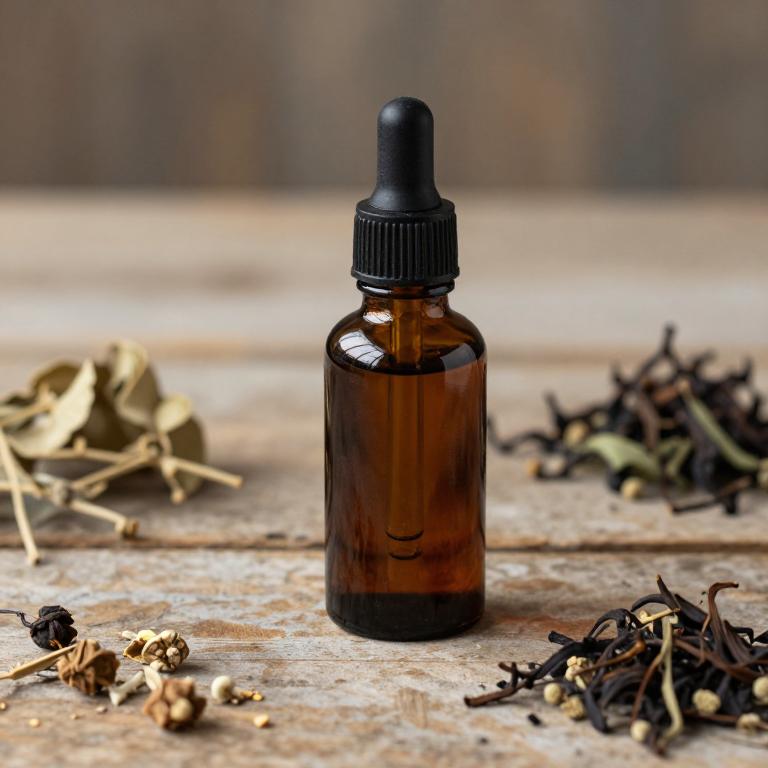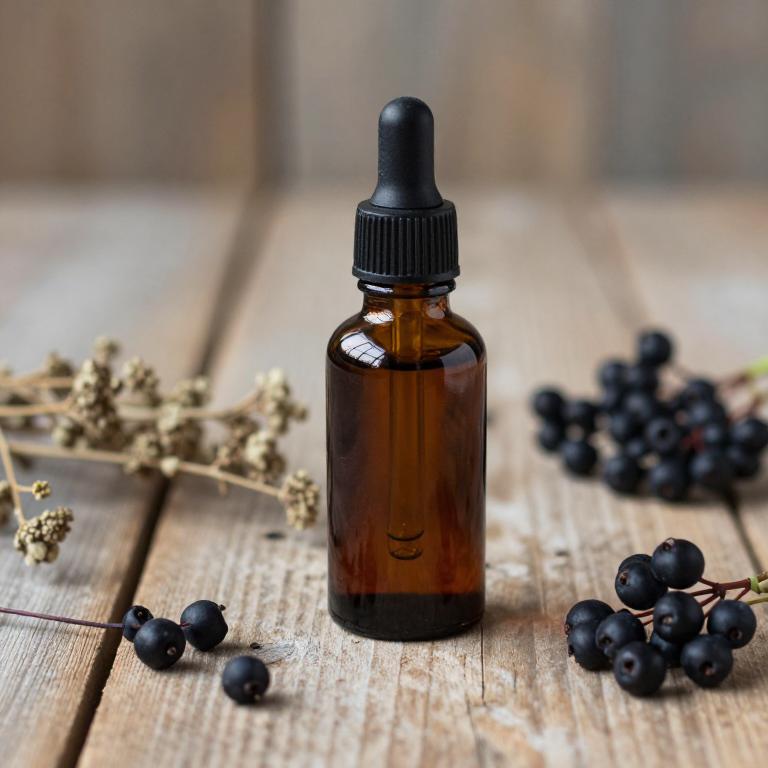10 Best Herbal Tinctures For Colds

Herbal tinctures for colds are concentrated liquid extracts made by soaking herbs in alcohol or glycerin, which helps preserve their active compounds.
These tinctures often contain ingredients like echinacea, elderberry, ginger, and garlic, known for their immune-supporting properties. They are typically easy to use, as a few drops can be taken several times a day, making them convenient for quick relief. Many people prefer herbal tinctures as a natural alternative to conventional cold remedies, though they should not replace professional medical advice for severe symptoms.
When choosing a tincture, it's important to look for high-quality, organic ingredients and consult with a healthcare provider, especially for those with allergies or taking other medications.
Table of Contents
- 1. Echinacea (Echinacea purpurea)
- 2. Ginger (Zingiber officinale)
- 3. Thyme (Thymus vulgaris)
- 4. Peppermint (Mentha piperita)
- 5. Rosemary (Rosmarinus officinalis)
- 6. Camellia (Camellia sinensis)
- 7. Fennel (Foeniculum vulgare)
- 8. Stinging nettle (Urtica dioica)
- 9. Salvia (Salvia officinalis)
- 10. Black elderberry (Sambucus nigra)
1. Echinacea (Echinacea purpurea)

Echinacea purpurea herbal tinctures are commonly used to support the immune system and alleviate symptoms of colds.
These tinctures are typically made by soaking the dried roots and leaves of the echinacea plant in alcohol, which helps extract its active compounds. Traditional use suggests that echinacea may reduce the duration and severity of cold symptoms by enhancing immune response. However, scientific evidence on its effectiveness remains mixed, with some studies showing benefits and others finding no significant impact.
As with any herbal remedy, it is important to consult with a healthcare provider before use, especially for individuals with allergies or those taking other medications.
2. Ginger (Zingiber officinale)

Zingiber officinale, commonly known as ginger, has been widely used in traditional medicine for its therapeutic properties, and its herbal tinctures are increasingly recognized for their potential to alleviate cold symptoms.
These tinctures are typically made by soaking fresh ginger root in alcohol or glycerin, which helps extract its active compounds such as gingerol and shogaol. The warming and anti-inflammatory effects of ginger tinctures can help reduce nasal congestion, soothe sore throats, and ease bronchial discomfort associated with colds. Additionally, ginger is known to support the immune system and may help shorten the duration of cold symptoms.
As a natural remedy, ginger tinctures offer a safe and effective alternative for those seeking relief from cold-related discomfort without relying on synthetic medications.
3. Thyme (Thymus vulgaris)

Thymus vulgaris, commonly known as thyme, is a popular herb used in traditional medicine for its potent antimicrobial and anti-inflammatory properties.
Thyme essential oil, often used in tinctures, is derived from the leaves and flowers of the plant and is known to support immune function and help alleviate symptoms of colds and respiratory infections. These tinctures are typically made by steeping thyme in alcohol, which helps extract its active compounds such as thymol and carvacrol. When used as a complementary remedy, thyme tinctures may help reduce congestion, soothe sore throats, and shorten the duration of cold symptoms.
However, it is important to consult with a healthcare professional before using thyme tinctures, especially for individuals with allergies or those taking medications.
4. Peppermint (Mentha piperita)

Mentha piperita, commonly known as peppermint, is a popular herb used in tinctures to help alleviate symptoms of colds.
These tinctures are often valued for their cooling and soothing effects, which can help reduce congestion and ease throat irritation. Peppermint tinctures may also promote clearer breathing by acting as a mild decongestant. They are typically made by steeping fresh or dried peppermint leaves in alcohol, creating a concentrated and potent form of the herb.
While they are not a cure for colds, peppermint tinctures can provide natural relief and support the body's recovery process when used as part of a holistic approach to wellness.
5. Rosemary (Rosmarinus officinalis)

Rosmarinus officinalis, commonly known as rosemary, is a versatile herb used in herbal tinctures for its aromatic and medicinal properties.
Rosemary tinctures are often utilized to support respiratory health and alleviate symptoms associated with colds, such as congestion and sore throat. The essential oils in rosemary, particularly camphor and cineole, have antimicrobial and decongestant effects that may help reduce inflammation and ease breathing. These tinctures can be taken internally or used topically, depending on the formulation and guidance from a healthcare professional.
While rosemary tinctures are generally considered safe, they should be used with caution, especially in individuals with certain health conditions or allergies.
6. Camellia (Camellia sinensis)

Camellia sinensis, commonly known as the plant from which green and black teas are derived, is often used in herbal tinctures to support the immune system and alleviate symptoms of colds.
These tinctures are typically made by extracting the active compounds from the leaves using alcohol, preserving the beneficial properties of the plant. The antioxidants and polyphenols present in Camellia sinensis may help reduce inflammation and boost the body's natural defenses against viral infections. While they are not a cure for colds, these tinctures can serve as a complementary remedy to ease discomfort and support recovery.
However, it is important to consult a healthcare professional before use, especially for individuals with pre-existing conditions or those taking other medications.
7. Fennel (Foeniculum vulgare)

Foeniculum vulgare, commonly known as fennel, is a herb widely used in herbal medicine for its potential benefits in alleviating cold symptoms.
Fennel tinctures are typically made by soaking the dried seeds in alcohol to extract their essential oils and active compounds. These tinctures are often used to ease coughs, reduce congestion, and soothe sore throats due to their expectorant and anti-inflammatory properties. The primary active compounds in fennel, such as anethole and fenchone, contribute to its therapeutic effects.
However, while fennel tinctures may offer some relief, they should not replace professional medical advice, especially for severe or persistent cold symptoms.
8. Stinging nettle (Urtica dioica)

Urtica dioica, commonly known as stinging nettle, is a versatile herb that has been used for centuries in traditional medicine, including the preparation of tinctures for colds.
These tinctures are typically made by soaking the dried leaves and stems of the plant in alcohol, which helps extract its active compounds such as flavonoids, vitamins, and minerals. Urtica dioica tinctures are believed to support the immune system and may help alleviate symptoms like congestion and sore throat due to their anti-inflammatory and antioxidant properties. They are often used as a natural alternative or complementary treatment during cold and flu seasons.
However, it is important to consult with a healthcare professional before using these tinctures, especially for individuals with allergies or existing health conditions.
9. Salvia (Salvia officinalis)

Salvia officinalis, commonly known as sage, has been traditionally used in herbal medicine for its potential benefits in treating colds and respiratory infections.
Sage tinctures are concentrated liquid extracts made from the dried leaves of the plant, often combined with alcohol or glycerin to preserve the active compounds. These tinctures are believed to help reduce symptoms such as sore throat, coughing, and nasal congestion due to their antimicrobial and anti-inflammatory properties. When used as a gargle or inhalant, sage tinctures may provide soothing relief and support the body's natural healing processes.
However, it is important to consult with a healthcare provider before using sage tinctures, especially for prolonged periods or in conjunction with other medications.
10. Black elderberry (Sambucus nigra)

Sambucus nigra, commonly known as elderberry, is a popular herbal remedy used to support the immune system and alleviate symptoms of colds.
Elderberry tinctures are made by soaking the dried berries in alcohol, which helps extract their bioactive compounds, such as flavonoids and antioxidants. These compounds are believed to have antiviral properties that may shorten the duration of a cold and reduce its severity. Many people use elderberry tinctures as a natural alternative to over-the-counter cold medications, often taking them at the first sign of symptoms.
However, it is important to consult with a healthcare provider before use, especially for those with autoimmune conditions or who are pregnant, to ensure safety and proper dosage.